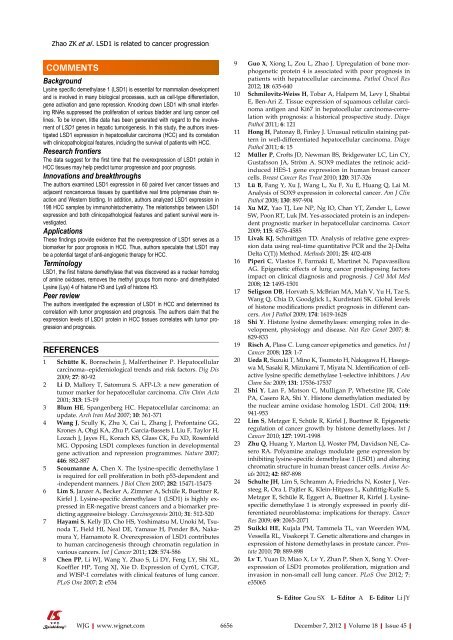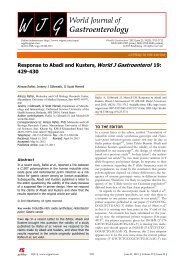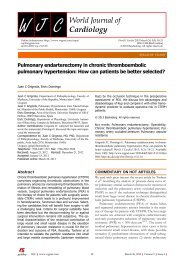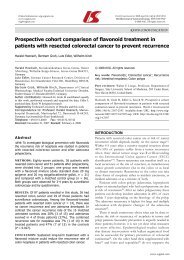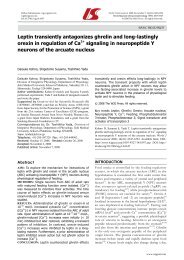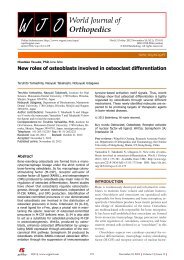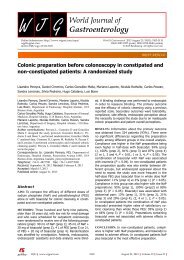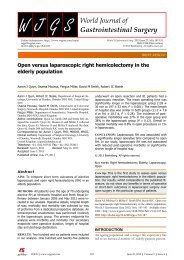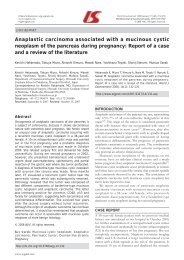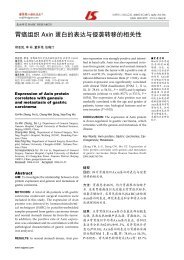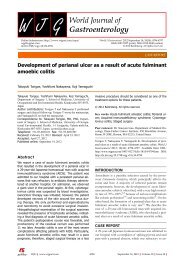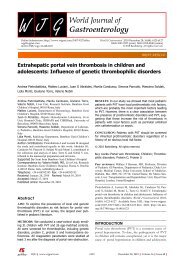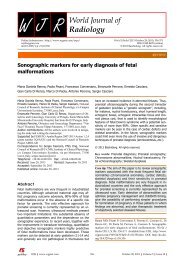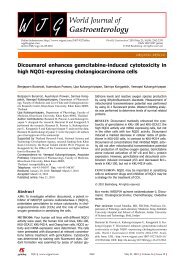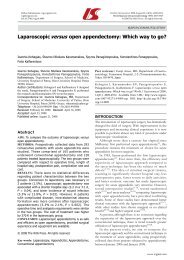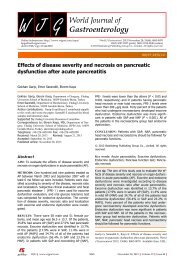45 - World Journal of Gastroenterology
45 - World Journal of Gastroenterology
45 - World Journal of Gastroenterology
You also want an ePaper? Increase the reach of your titles
YUMPU automatically turns print PDFs into web optimized ePapers that Google loves.
Zhao ZK et al . LSD1 is related to cancer progression<br />
COMMENTS<br />
Background<br />
Lysine specific demethylase 1 (LSD1) is essential for mammalian development<br />
and is involved in many biological processes, such as cell-type differentiation,<br />
gene activation and gene repression. Knocking down LSD1 with small interfering<br />
RNAs suppressed the proliferation <strong>of</strong> various bladder and lung cancer cell<br />
lines. To be known, little data has been generated with regard to the involvement<br />
<strong>of</strong> LSD1 genes in hepatic tumorigenesis. In this study, the authors investigated<br />
LSD1 expression in hepatocellular carcinoma (HCC) and its correlation<br />
with clinicopathological features, including the survival <strong>of</strong> patients with HCC.<br />
Research frontiers<br />
The data suggest for the first time that the overexpression <strong>of</strong> LSD1 protein in<br />
HCC tissues may help predict tumor progression and poor prognosis.<br />
Innovations and breakthroughs<br />
The authors examined LSD1 expression in 60 paired liver cancer tissues and<br />
adjacent noncancerous tissues by quantitative real time polymerase chain reaction<br />
and Western blotting. In addition, authors analyzed LSD1 expression in<br />
198 HCC samples by immunohistochemistry. The relationships between LSD1<br />
expression and both clinicopathological features and patient survival were investigated.<br />
Applications<br />
These findings provide evidence that the overexpression <strong>of</strong> LSD1 serves as a<br />
biomarker for poor prognosis in HCC. Thus, authors speculate that LSD1 may<br />
be a potential target <strong>of</strong> anti-angiogenic therapy for HCC.<br />
Terminology<br />
LSD1, the first histone demethylase that was discovered as a nuclear homolog<br />
<strong>of</strong> amine oxidases, removes the methyl groups from mono- and dimethylated<br />
Lysine (Lys) 4 <strong>of</strong> histone H3 and Lys9 <strong>of</strong> histone H3.<br />
Peer review<br />
The authors investigated the expression <strong>of</strong> LSD1 in HCC and determined its<br />
correlation with tumor progression and prognosis. The authors claim that the<br />
expression levels <strong>of</strong> LSD1 protein in HCC tissues correlates with tumor progression<br />
and prognosis.<br />
REFERENCES<br />
1 Schütte K, Bornschein J, Malfertheiner P. Hepatocellular<br />
carcinoma--epidemiological trends and risk factors. Dig Dis<br />
2009; 27: 80-92<br />
2 Li D, Mallory T, Satomura S. AFP-L3: a new generation <strong>of</strong><br />
tumor marker for hepatocellular carcinoma. Clin Chim Acta<br />
2001; 313: 15-19<br />
3 Blum HE, Spangenberg HC. Hepatocellular carcinoma: an<br />
update. Arch Iran Med 2007; 10: 361-371<br />
4 Wang J, Scully K, Zhu X, Cai L, Zhang J, Prefontaine GG,<br />
Krones A, Ohgi KA, Zhu P, Garcia-Bassets I, Liu F, Taylor H,<br />
Lozach J, Jayes FL, Korach KS, Glass CK, Fu XD, Rosenfeld<br />
MG. Opposing LSD1 complexes function in developmental<br />
gene activation and repression programmes. Nature 2007;<br />
446: 882-887<br />
5 Scoumanne A, Chen X. The lysine-specific demethylase 1<br />
is required for cell proliferation in both p53-dependent and<br />
-independent manners. J Biol Chem 2007; 282: 15471-15475<br />
6 Lim S, Janzer A, Becker A, Zimmer A, Schüle R, Buettner R,<br />
Kirfel J. Lysine-specific demethylase 1 (LSD1) is highly expressed<br />
in ER-negative breast cancers and a biomarker predicting<br />
aggressive biology. Carcinogenesis 2010; 31: 512-520<br />
7 Hayami S, Kelly JD, Cho HS, Yoshimatsu M, Unoki M, Tsunoda<br />
T, Field HI, Neal DE, Yamaue H, Ponder BA, Nakamura<br />
Y, Hamamoto R. Overexpression <strong>of</strong> LSD1 contributes<br />
to human carcinogenesis through chromatin regulation in<br />
various cancers. Int J Cancer 2011; 128: 574-586<br />
8 Chen PP, Li WJ, Wang Y, Zhao S, Li DY, Feng LY, Shi XL,<br />
Koeffler HP, Tong XJ, Xie D. Expression <strong>of</strong> Cyr61, CTGF,<br />
and WISP-1 correlates with clinical features <strong>of</strong> lung cancer.<br />
PLoS One 2007; 2: e534<br />
WJG|www.wjgnet.com<br />
9 Guo X, Xiong L, Zou L, Zhao J. Upregulation <strong>of</strong> bone morphogenetic<br />
protein 4 is associated with poor prognosis in<br />
patients with hepatocellular carcinoma. Pathol Oncol Res<br />
2012; 18: 635-640<br />
10 Schmilovitz-Weiss H, Tobar A, Halpern M, Levy I, Shabtai<br />
E, Ben-Ari Z. Tissue expression <strong>of</strong> squamous cellular carcinoma<br />
antigen and Ki67 in hepatocellular carcinoma-correlation<br />
with prognosis: a historical prospective study. Diagn<br />
Pathol 2011; 6: 121<br />
11 Hong H, Patonay B, Finley J. Unusual reticulin staining pattern<br />
in well-differentiated hepatocellular carcinoma. Diagn<br />
Pathol 2011; 6: 15<br />
12 Müller P, Cr<strong>of</strong>ts JD, Newman BS, Bridgewater LC, Lin CY,<br />
Gustafsson JA, Ström A. SOX9 mediates the retinoic acidinduced<br />
HES-1 gene expression in human breast cancer<br />
cells. Breast Cancer Res Treat 2010; 120: 317-326<br />
13 Lü B, Fang Y, Xu J, Wang L, Xu F, Xu E, Huang Q, Lai M.<br />
Analysis <strong>of</strong> SOX9 expression in colorectal cancer. Am J Clin<br />
Pathol 2008; 130: 897-904<br />
14 Xu MZ, Yao TJ, Lee NP, Ng IO, Chan YT, Zender L, Lowe<br />
SW, Poon RT, Luk JM. Yes-associated protein is an independent<br />
prognostic marker in hepatocellular carcinoma. Cancer<br />
2009; 115: <strong>45</strong>76-<strong>45</strong>85<br />
15 Livak KJ, Schmittgen TD. Analysis <strong>of</strong> relative gene expression<br />
data using real-time quantitative PCR and the 2(-Delta<br />
Delta C(T)) Method. Methods 2001; 25: 402-408<br />
16 Piperi C, Vlastos F, Farmaki E, Martinet N, Papavassiliou<br />
AG. Epigenetic effects <strong>of</strong> lung cancer predisposing factors<br />
impact on clinical diagnosis and prognosis. J Cell Mol Med<br />
2008; 12: 1495-1501<br />
17 Seligson DB, Horvath S, McBrian MA, Mah V, Yu H, Tze S,<br />
Wang Q, Chia D, Goodglick L, Kurdistani SK. Global levels<br />
<strong>of</strong> histone modifications predict prognosis in different cancers.<br />
Am J Pathol 2009; 174: 1619-1628<br />
18 Shi Y. Histone lysine demethylases: emerging roles in development,<br />
physiology and disease. Nat Rev Genet 2007; 8:<br />
829-833<br />
19 Risch A, Plass C. Lung cancer epigenetics and genetics. Int J<br />
Cancer 2008; 123: 1-7<br />
20 Ueda R, Suzuki T, Mino K, Tsumoto H, Nakagawa H, Hasegawa<br />
M, Sasaki R, Mizukami T, Miyata N. Identification <strong>of</strong> cellactive<br />
lysine specific demethylase 1-selective inhibitors. J Am<br />
Chem Soc 2009; 131: 17536-17537<br />
21 Shi Y, Lan F, Matson C, Mulligan P, Whetstine JR, Cole<br />
PA, Casero RA, Shi Y. Histone demethylation mediated by<br />
the nuclear amine oxidase homolog LSD1. Cell 2004; 119:<br />
941-953<br />
22 Lim S, Metzger E, Schüle R, Kirfel J, Buettner R. Epigenetic<br />
regulation <strong>of</strong> cancer growth by histone demethylases. Int J<br />
Cancer 2010; 127: 1991-1998<br />
23 Zhu Q, Huang Y, Marton LJ, Woster PM, Davidson NE, Casero<br />
RA. Polyamine analogs modulate gene expression by<br />
inhibiting lysine-specific demethylase 1 (LSD1) and altering<br />
chromatin structure in human breast cancer cells. Amino Acids<br />
2012; 42: 887-898<br />
24 Schulte JH, Lim S, Schramm A, Friedrichs N, Koster J, Versteeg<br />
R, Ora I, Pajtler K, Klein-Hitpass L, Kuhfittig-Kulle S,<br />
Metzger E, Schüle R, Eggert A, Buettner R, Kirfel J. Lysinespecific<br />
demethylase 1 is strongly expressed in poorly differentiated<br />
neuroblastoma: implications for therapy. Cancer<br />
Res 2009; 69: 2065-2071<br />
25 Suikki HE, Kujala PM, Tammela TL, van Weerden WM,<br />
Vessella RL, Visakorpi T. Genetic alterations and changes in<br />
expression <strong>of</strong> histone demethylases in prostate cancer. Prostate<br />
2010; 70: 889-898<br />
26 Lv T, Yuan D, Miao X, Lv Y, Zhan P, Shen X, Song Y. Overexpression<br />
<strong>of</strong> LSD1 promotes proliferation, migration and<br />
invasion in non-small cell lung cancer. PLoS One 2012; 7:<br />
e35065<br />
S- Editor Gou SX L- Editor A E- Editor Li JY<br />
6656 December 7, 2012|Volume 18|Issue <strong>45</strong>|


